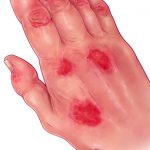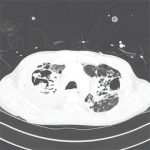NEW YORK (Reuters Health)—Fluctuations in the gut microbiome over time could underlie inflammatory bowel disease (IBD), including Crohn’s and ulcerative colitis, researchers suggest. “Both the state and the dynamics of the human gut microbiome in healthy individuals are highly personalized. Although cross-sectional studies have revealed dysbiosis of the gut microbiome in IBD, little is known…

Anti-Interleukin-6 Therapy for Erdheim-Chester Disease Warrants Study
Erdheim-Chester disease (ECD) is a rare, non-Langerhan’s cell histiocytosis characterized by tissue infiltration of CD68-positive and CD1a-negative foamy histiocytes.1 ECD was discovered as a lipid granulomatosis in 1930 by Jakob Erdheim and his pupil, William Chester, and approximately 500 cases have been described to date.1 ECD has a heterogeneous course and prognosis ranging from an…

Pulse Therapy & Lupus Nephritis: A 40-Year History, 1976–2016
Corticosteroids still represent the mainstay of treatment of patients with active disease. They have been used for more than 60 years, and although prolonged use is associated with organ damage, they have been shown to be lifesaving in various phases of the history of the disease. History of Use First introduced in the late 1960s…

Research Identifies Two New Cell Types in Sjögren’s Syndrome
Two previously unidentified cellular players in the pathogenesis of primary Sjogren’s syndrome (pSS) have been discovered: a regulatory T cell (Prdm1+eTreg) and a helper T cell (Il21+Th1). In the study, researchers also identified the transcriptional signatures of these cells and their differential dependency on the lymphotoxin/LIGHT signaling axis, which may guide future therapeutic interventions…

New Insights into Cartilage & Tendon Differentiation
By examining the phenotypic plasticity of cartilage and tendon cells, researchers found that oxidative stress and P13K signaling pathways are key modulators of the phenotype of musculoskeletal cells. Using monolayer and three-dimensional cultures, the experiments confirmed that dedifferentiation occurs via reductions in expression of genes for cartilage (Col2a1, Agcn) and tendon (Tnmd, Serpinf1)…

Varicella Zoster Virus Downregulates Programmed Death & Promotes Inflammation
A recent study found that the varicella zoster virus downregulates expression of programmed death ligand 1 and major histocompatibility complex 1 in brain fibroblasts, perineurial cells and lung fibroblasts. These effects may lead to persistent inflammation in the vessels and lungs, as well as promote subsequent infection of T cells and the spread of the virus…

2015 Treatment Recommendation Updates for Psoriatic Arthritis Address Comorbidities, New Medications
In May, the Group for Research and Assessment of Psoriasis and Psoriatic Arthritis (GRAPPA) published its recommendations for the treatment of psoriatic arthritis (PsA).1 The updated recommendations represent advances in drug development and availability since previous recommendations published in 2009, as well changes in treatment paradigms and the importance of associated aspects of the disease.2…

Systemic Corticosteroid Usage in Stage 4 Pulmonary Sarcoidosis Could Offer Little Benefit, Pose Significant Health Risk
Depending on stage, severity and rate of progression of disease, systemic corticosteroids are commonly used to treat pulmonary sarcoidosis. However, a review of the literature suggests they have limited usefulness in advanced stage IV pulmonary sarcoidosis. Once sarcoidosis has advanced to this degree, steroid use may unnecessarily expose a patient to life-threatening complications, as demonstrated…

Research Underscores Need to Assess Oral Health in Patients with Systemic Sclerosis
Oral health is not frequently considered within the sphere of a rheumatologist’s practice. However, recent results published by the Canadian Scleroderma Research Group (CSRG) point out the importance of assessing oral health in patients with systemic sclerosis (SSc). Result of 3-Year Grant Between 2008 and 2011, 163 patients with SSc and 231 controls were entered…

Otulipenia: From Inflammatory Case Studies to Treatment
Otulipenia is a recently discovered autoinflammatory disease caused by germline mutations, which results in dysregulated ubiquitination in patients. In a small-scale study, researchers used exome sequencing and candidate gene screening to identify three different loss-of-function mutations in the OTULIN/FAM105B gene in patients…
- « Previous Page
- 1
- …
- 17
- 18
- 19
- 20
- 21
- …
- 35
- Next Page »